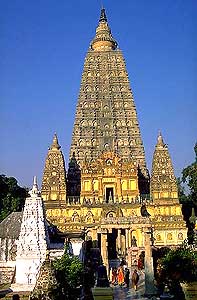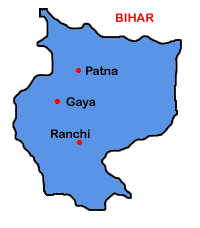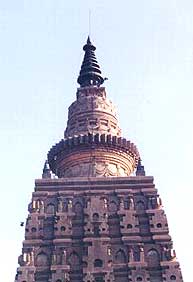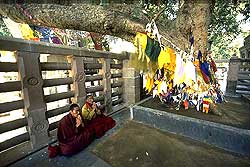Passing Through
Bodhi Gaya
BY JAN HAAG
Bihar --
Why Buddha, twenty-five centuries ago, chose this unutterably
forsaken spot to sit under a Bo tree, I can't imagine. Nor can I guess why Ashoka, great
warrior turned Buddhist, should establish the capital of his empire a hundred miles north
in the equally desolate landscape at Pataliputra in the third century, B.C.
 The town, now
called Patna, could not be less inviting, nor more heat-battered, grimy, dusty and
austere. Surely, since the human body has not altered that much in twenty-five hundred
years, the heat of 115 degrees in the shade -- hotter at night, as the concrete walls
re-radiated their heat, in the monastery where I stayed -- must have been no less a
torment in the fifth century B.C.
The town, now
called Patna, could not be less inviting, nor more heat-battered, grimy, dusty and
austere. Surely, since the human body has not altered that much in twenty-five hundred
years, the heat of 115 degrees in the shade -- hotter at night, as the concrete walls
re-radiated their heat, in the monastery where I stayed -- must have been no less a
torment in the fifth century B.C.
Under Buddha's
tree, it was probably even more scorching then, as, presumably, the Bo tree was smaller
and cast less shade -- or maybe not. For this is not the identical Bo tree under which
Buddha sat, but its progeny. The present tree was brought back as a sapling from Sri Lanka
where a cutting of Buddha's Bodhi tree was taken by the nephew of Emperor Ashoka before
the original tree died. I'm not exactly sure of the dates of these horticultural
transfers. I even suspect they may be apocryphal, but the tree that stands in Bodh-Gaya
now is immense. And it makes absolutely no difference in the intensity of the pre-monsoon
heat whether you are sheltered under its dense foliage or not. Shade counts for less in
this landscape than twilight and early morning. Maybe there is a certain coolness under
its shelter in the night -- but, at that time, the gates to the Mahabodhi Temple complex
are locked.
Buddha sat under
the Bo tree for six years, according to some legends, or six days according to others,
before he attained enlightenment. I wonder what he did for the comfort of his bowels. Did
he eat? Who fed him? A six-day trance fringes the possible. A six-year trance is not like
anything you or I can easily believe, could do, or would likely want to. What exactly
would enlightenment be, I asked myself.
Getting to
Bodh-Gaya is one story, being there in the crucifying sun is another.
It takes more than five hours to travel from Patna to Gaya by train, a
distance of not more than seventy-five miles. Arriving at the Patna train station at dawn,
I was early enough to have a choice of train car. I chose a car half drenched by water
leaking from the roof onto the seats opposite me, thinking it might mean the car would
remain cooler and stay less crowded. Not so. Bit by bit, even before we left the station,
people encroached onto the wet seats, sat on the wet floor absorbing the water into their
clothes and, soon, the heat had dried the residue. |
 |
Before we had gone
ten slow stops on this slowest of all local and stopping trains, we were, as is usual in
India, packed tighter than any American can realistically visualize. The ceiling
sprouted fans in all directions. Not one of them worked. I sat in the doorway, my legs
hanging down over the metal plates of the stairs, just above the gravel, grit and shit of
the railway embankment, grateful for the wind when we were in motion.
The searing heat
and the inhuman crush never overcomes the patient good cheer of the ordinary Indian. But I
was ill, in a torment of loose bowels, and hungry. I feared to eat the cucumbers which
were the only edibles available on the train. But after I ran short of my tepid,
supposedly "good," water obtained from the last hotel, an Indian -- Indians are
always kind and observant -- offered me half a long pale, what we would call,
"English" cucumber. Cut lengthwise and sprinkled with chili, I could not in all
politeness refuse to eat it. So, I let go of the fear of his dirty hands, the dirtier
hands of the vendor and the filthy basket in which the cucumber had rested since it had
been taken, no doubt, unwashed from the earth. The heat is so intense in India, I told
myself, it makes all clean. I felt momentarily refreshed. I had been in India years before
and not been sick. Indeed, I had just come down from Kathmandu specifically to recoup my
health, to steady my bowels, to find something I could or wanted to eat.
After the five hour
train ride to Gaya, it took another hour to get from Gaya to Bodh Gaya in a three-wheel
motorized rickshaw (I think they're sometimes called "tempos") made for six
people but carrying fourteen -- for which I was double charged because of my white skin.
Even so, the cost was about fifty cents for maybe twenty miles.
I didn't then know
the phenomenon by name, but I arrived in the town of Buddha's enlightenment the day the
"pre-monsoon heat" struck. Each year, a month or so before the monsoon begins,
the heat jumps, from one day to the next, by ten or fifteen degrees. It is expected. And
it is welcomed. It is a sign that "the monsoon will be good this year." This
year the rain was much needed. All of India, I had heard, was suffering from one of the
worst droughts in its history.
Arriving at the
gates of the Burmese monastery at noon, with the sun firing down its incinerating blasts,
I wept to find a sign on the locked metal fence announcing that it would not be opened
again until 2:00 P.M. Tears ran down my cheeks as I banged on the gate, rattling its
chain, rocking its hot-as-a-branding-iron frame. Finally the ubiquitous young Indian lad
appeared (on my side of the gate), gleaned my story and disappeared. Within a few minutes
a toothy old man -- four teeth stuck straight out like individual canopies over his lower
lip -- came and opened the gates. Dressed in a dhoti, he spoke a bit of sing-song English
and was, for many days to come, as kind as a grandfather to me.
He led me out of
the blazing sun into a room that seemed cool by contrast even though it must have been
well over one hundred degrees. Electricity for the fan was "temporarily" off
then, as I found it was to be at least half the time for the duration of my visit. The
room was thick with dust, and the undersides of the shelves of the whitewashed wall
recesses were blackened by soot from naked candle flames and their surfaces encrusted with
wax -- this should have been a warning about the electricity, but I was too ill to
recognize it at that moment. There were two hard pallets with clean white sheets folded
across them and yards of greyed mosquito netting. I lay down exhausted, ready to vomit,
begging for water which the fellow with the teeth got, tepid, from a garden faucet. I
tried to ascertain, as any already indisposed tourist would, by asking impolite questions,
whether or not it was safe to drink. He assured me the monastery had excellent water. This
was confirmed by others on the following days, though where it came from in that parched
landscape I never knew. Up from the ground somehow. Was it a well? It was good water they
said -- but nothing could keep it from being tepid. I, who do not like ice-water, longed
for the clink of just a few civilized cubes against a sparkling clean glass. I slept and
woke and slept again.
Was I close to
death? I might have been. Probably I suffered from heat stroke. Certainly I suffered from
hunger. They served no food to guests in the monastery. It was more than a mile into town
-- what was I to do? Two days later, I persuaded the ancient one to get me some food. He
brought two small watermelons for me from the town; he, no doubt, had sent the lad. One I
ate straight down, for the water and for the sugar; by the next day, the second had began
to sour in the heat. I ate it anyway, not knowing when I would get another bit of food. It
was a mistake. Diarrhea began again. On the third day I bought a plate of rice across the
road at the grass and bamboo shack that seemed to be home to the lad and a considerable
number of other family members. I ate two spoonfuls before I carried it "home,"
and then it, too, spoiled before I was hungry again.
The incandescent
sun circled in a sky which was pure white, as if the heat had burnt up all the blue.
Across the road was the Falgu river, a mile wide, flatter and drier than the Sahara.
Palms, gone pale in the light, shagged its edges. Almost no one moved from mid-morning to
twilight. On my bed, I lay wondering if this was where I would leave this world. I didn't
care.
Though I rarely
read novels any more, a desire to re-read Thomas Mann's Magic Mountain had recently come
over me while I was sitting in Korea in the three months silence of Kyol Che (the Buddhist
winter practice).
When I could stand
a bit better, and needed something to do other than feel the pulsing of my despair, I
asked about the English Library that was mentioned in my guide book. From the porch of my
room in the separate dormitory, a fellow pilgrim pointed toward the furtherest corner of
the second floor of the main hall. I mounted the back stairs into an emptiness of grit
more desolate than the river beyond the road. One or two bits of English furniture lay
about and parts of an old four-postered bed, a broken chair. Otherwise there was nothing
on that vast second floor of the monastery.
Below the library, on the ground floor, in the long darkness of their
refectory, the handsome, bronzed, young (they were actually in their forties but looked
twenty), orange-clad monks watched television all day. At night, returning on their
motorcycles, I knew not from where, they slept on the refectory floor or on charpoys in
the garden. They were delightfully friendly and hugely enjoyed the tourists cum pilgrims
like me - when I began to put in appearances after the worst of my illness was over. The
dozen or so of us staying at the monastery were a motley crew. |
|
 |
There was one
regal, young Anglo-Indian woman who, with a Spanish companion, was helping to build the
first small structure for a Tibetan monastery out in some field. There was a young English
girl, named Teresa, tall, round-faced, who was planning to return to England to study law
after some two years of wandering. She, more or less, save my life. There was a lovely,
smiling Indian woman by the name of Jesse, who called herself a Christian sadhu. She went
about doing her version of good which did not necessarily jibe with the monks' idea of
good. She had, apparently, quite out-stayed an originally warm welcome. There were also a
Korean lad with his Japanese friend; several portly nuns from Thailand who spoke only
Thai; and others whom I saw only in passing in the mosquito-filled nights when the fans
stopped their indolent turning, went dead along with the 25 watt light bulbs -- and we all
wandered out, candles in hand, from our suffocating rooms to dodge and swat the insects.
I stepped across
the dust and desertion, tiptoeing my way to the furthermost corner of the monastery's
shadowed upper story, and there, on the slanting-like-a-teeter-totter shelves of what had
once been a piece of nineteenth century furniture, was a crazily tumbled collection of
books: mostly novels, detective stories, a few scientific treatises, almost nothing to do
with the spirit, less to do with literature, obviously stuff pilgrims had unloaded from
their backpacks rather than carry onward. To my amazement, and thanks be to Buddha, there
was a densely printed, translated-into-English paperback of The Magic Mountain. Was I
surprised? I suppose so. But the heat under the uninsulated ceiling was rising. I grabbed
the book and fled.
In my room, through
the days that followed, I read it slowly, interspersing my heavy-headed lack of enthusiasm
for Mann's ponderous Germanic analysis of the world before chaos -- or just when chaos was
beckoning -- with visits to the ladies room, thick with mosquitos and crackly with
lizards. I tried to catch the water in the shower and the sink and garden faucets when the
water was on. The whole system, apparently, worked via an electric pump and went out as
often as the fans. I drank and drank and drank the tepid water. Nothing slaked my thirst.
Jesse taught me to toss a bucket of water onto the composition stone floor and to hang
sheets -- in my case, two sarongs I had bought in Thailand -- dripping wet from a line so
that the evaporation of all this water cooled my room -- if ever so slightly.
Over maybe a week's
time I got better, and I got worse. I became friends with healthy Teresa who had worked
for six months on a sheep ranch in Australia and as a nanny in the outback. She brought me
an egg that Jesse cooked and bitter black tea which is excellent for stablizing the
bowels. Finally, I asked for a doctor. He came and prescribed electrolytes, just as they
do in the U.S.A., and almost in the same form: a sickishly sweetened liquid like Gatoraid,
which I tried to drink but couldn't. The doctor also gave me medicines, also abominably
sweet. But the doctor, a most sympathetic Indian man, with medicines -- he threw in some
antibiotics in mercifully swallowable pill-form -- and house visit included, cost only
about $5 -- better odds than a health care plan.
I wondered, I
wonder still, why I didn't just let myself die. Not sadly, or for any reason or lack of
reason, but simply because I didn't know where to go or what to do. I had no interest
whatsoever in living. Indeed, one night when a funeral procession, carrying candles and
branches, came walking along the road and out across the river bed, I found myself quite
envying the corpse, draped,as it was, on a bier of wood, decorated all around with
withered palm fronds that rattled in the wind.
Eventually,
however, with the help of Teresa, I shook off my ennui enough to stagger, at twilight,
into town to eat omelets on chappatis. She took me to a rather magnificent lean-to built
of stripped young saplings and palm fronds at a wide place on the dirt road in central
Bodh-Gaya. She had been in town for several months and knew a good many of the people, all
the paths and most of the restaurants.
Bodh-Gaya. How can
I give you a sense of it? It's actually a pretty little town and must be beautiful in the
rains. It's flat but surrounded by fields. It's animated because enough tourists and
pilgrims come there to have inspired the entrepreneurial spirit in some of its
inhabitants. But the friendliness is still genuine. There are monasteries housing monks of
many nationalities scattered all over the town and fields. At that season -- it was May --
they looked closed up and deserted even though, with a search, one could always find a
door open and a monk, at last, to lead you to the dharma hall.
After a few days of
omelets and dharma halls, I found my way, very early one morning, to the Mahabodhi Temple.
I entered the sacred ground. The dawn was already losing its crimson hue above the horizon
at what? -- 4:30, maybe 5:00, in the morning. I was alone. I stepped through a little low
wrought iron gate into the complex, or maybe it was wrought copper, for it was
turquoise-green with age. Beyond this decorative barrier, a rather wild, somewhat junglely
garden grew among pillars and stupas. There were shoulder high flowers, some green things
I didn't know, and lilies. One had the feeling it was watered here. I stepped into the
temple. It was silent, gray, stone and lonely. Statues and carvings stood about in shafts
of early light. But I knew this wasn't where I wanted to be. It was the Bo tree I had come
to see. There was no one around to ask where it might be.
I went back out
into the morning dazzle. I turned to my right, noticing a ways off an embankment which I
never did go to investigate. I learned later from a map of the complex that it was a lake.
Perhaps I was lucky not to have discovered it at the time; I might have jumped right in. I
walked to the right around the vast temple building. And soon, scattered at my feet, near
the temple's back corner, were elegant, heart shaped leaves with long curved points. They
were scattered everywhere, and the wind blew more, green and golden, to the ground. I
looked up. There was the vast tree. I didn't need to ask or look for a plaque. It was as
huge and dark as a mango tree in the glittering gold of sunrise.
I stood for a long
time, watching the gentle wind scattering the leaves. The Bo tree, though larger by far,
reminded me of the balm of Gilead trees I have seen in the American desert, quivering and
shimmering in the overwhelming light.
Facing the sun, I
sat down with my back to the tree. My mind went blank. I tried to think about Buddha. But
I had no thoughts. I tried to think about enlightenment, but no images came. The leaves
scattered and I watched. There was no joy. There was even no disappointment. Just a vast
neutrality. I watched the leaves fall. There was no lightning bolt of insight, no great
awareness to record. The sun rose a little higher. A few more leaves fell, and soon they
stopped falling as the wind stopped with the coming of the hotter part of the morning.
I never take
mementos home when I travel. I carry no packages, trinkets, or works of art from place to
place. Even the most temptingly beautiful sea shells and stones I have learned to leave
where they lie. But the idea came to me to pick up a whole, maybe half-inch-thick, packet
of the Bo tree leaves. Gently, one by one, I laid them one atop another on my hand.
Then I walked on
through the garden at the back. India's gardens are different than Western gardens. They
are sparser and each plant, shrub and small tree is very individualistic. There's little
"landscaping," and no decorator feeling at all about most Indian gardens. Just
as each human is to be taken on their own terms, so is each plant. There is a plan, you
can tell, but no cohesion.
When I got back to
the monastery, I did not know what to do with the leaves. Though turning toward the gold
of autumn, they were still fresh and succulent, and fragile. I finally decided to put them
between the leaves of my "Kathmandu and the Kingdom of Nepal," Lonely Planet
guide book -- Buddha, after all, born in Lumbini, by the new drawn borders of today, would
be a Nepalese. There, between the pages of the book a few leaves, half a dozen maybe,
beautifully molded, remain to this day. The others, a dozen or two, I gave away to
friends, family, some to strangers, human beings all, briefly met and briefly loved. But
each of those, too, those given leaves, have left their greenish-gold-brownish mold in
heart-shaped patterns on the pages of my book.
 |
|
One day, soon after the day I sat under the Bo tree, Teresa and I, because
I felt I was as well as I would ever get in the heat, decided to take the bus to Sasaram,
on our way to Varanasi. On our last night at the Burmese monastery, the monks took us to
visit |
their new monastery
where each private room had its own flush toilet. Still under construction, it was out on
a plain about three miles from town. They served us tea -- that murky, spicey, sweet,
boiled-with-milk-and-sugar Indian chai which I happened to love, but which makes me
immediately sick. I was about to decline, but thought, for politeness sake, ah! one more
stomach ache, what does it matter? and tasted it. It turned out to be, of all things,
Ovaltine! shades of Captain Midnight!
The next day, in
their old car that spat and sputtered, the monks drove us, against their better judgement,
"nobody takes the bus from Gaya," (everyone takes the train, those infinitely
slow monsters the British left, that for some esoteric reason the Indian national pride
has become enamored with) to the bus station in Gaya. From there, we two women, squashed
into a rumbling bus, headed out across the dryness of the Gangetic plain where all color
had long ago been leached from the land.
Eventually, we came
to the British built Grand Trunk Road, now one solid traffic jam lined with lorry stops
and truck repair shops, across the north of the subcontinent. Wedged in by families and
bundles and baskets of foodstuffs, sacks of rice and wheat, a certain amount of small live
stock, we squinted through the dusty windows -- and I knew, again, why I had come to
India. Heaven must be like this, I thought, at least the scruffy kind of heaven in which I
would like to abide forever.
Nothing appeals to
my soul more than a rocking, lurching bus ride, pressed all around by hundreds of
patiently beautiful Indians. As I look out at the pale landscape of rocks and stones and
dryness and dust and an occasional tree -- always with a bullock cart and white clad
driver beneath its branches -- India bewitches me. It is, to me, the rarest of opiums to
move through that sacred land, whether by bus or, when I felt better, on foot. It in
itself is a raison d'etre. A reason for being. There is no question that its heat cannot
absorb. What did I learn in Bodh-Gaya where Buddha sat under the Bo tree? I got up off my
bed and moved on. No more. But no less.
Besides, how else
would I have found out that the most holy city in India, the sacred city of Varanasi, the
"city of light," -- some say, the oldest city in the world -- exists only on one
side of the Ganges? Across the river it is empty sand.